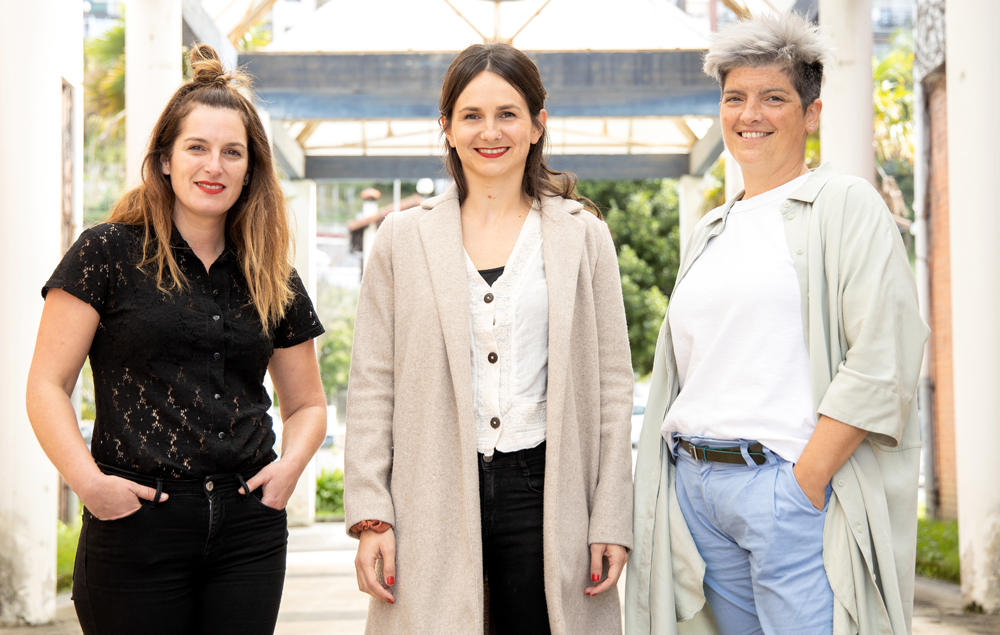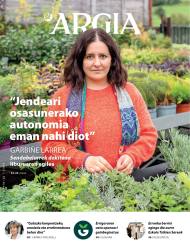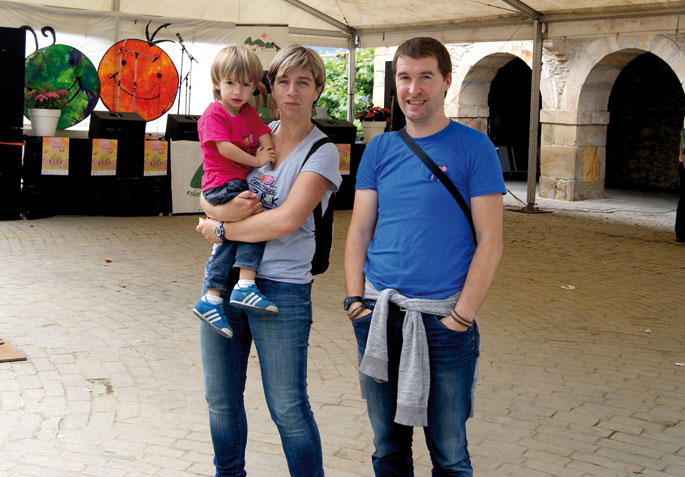"We are not an alternative to anything, we are a quality public education in small towns"
- Because of the pandemic, many have looked enviously at small schools, their small groups, large outer spaces and rural areas. We have talked to the Basque Eskola Txikiak about what we have and the challenges they have to learn from these centres, on the pretext that there has been a change in leadership. The network comprises 54 schools in Araba, Bizkaia and Gipuzkoa, with a strong presence: "Small towns aren't a place to sleep, they're not a picture, they're living areas, and that's where local school is key."

Mikel Goñi has been in the coordination of the Eskola Txikiak of the Basque Country for nine years, and when he arrived he tells us that some schools felt marginalized in the definition of small schools, because both understood differently what a small school is. He believes that in these years they have achieved a definition in which everyone feels comfortable, with the objective of an increasingly targeted school for more pupils and a school to learn better and better: “Our school is a small public school that promotes diversity, located in the rural environment, and thanks to these characteristics offers many opportunities. I think that in that description, all those who are part of the small school network feel identified, and that's important. Then, in this sense, each one marks its course, betting on technology, anti-technological, from a broad view of diversity, from a concrete methodology...”.
At this time when he has stopped coordinating, Goñi has started a phase in which the small school network opens up many new opportunities, which he believes will reduce many schools, “getting closer to us”, due to the decline in the population, which will allow the small school group to be expanded and strengthened. From now on, moreover, coordination will be made up of three different heads responding to the workload, but also because the group, shared leadership or mutual support are important characteristics in small schools. As coordinator, Goñi did not work directly with the students in the center, “and that does not benefit, because when I have returned to the classrooms I am seeing that the realities and trends of day to day are different, so it is important that two of the three members who have taken control of the coordination continue in school, because that will give another sensitivity and a basis to the coordination team”.
"The feeling of isolation and weakness may be due to its small size and it was important to start meeting and becoming a group. We want to continue to deepen the network"
Irati Manzisidor, Miren Odriozola and Jugatx Ormaetxea also know that they have embarked on a challenging path. They highlight, on the one hand, the strengthening of the network and the maintenance of food as one of its main tasks. “The feeling of isolation, loneliness and weakness may be due to its small size and is an important turning point when they began to group and became groups, there is that network character that we have been expanding in recent years (from provinces to community), we want to continue to deepen and deepen, and the network not only of teachers, but of the entire educational community, parents, students and educators.”
Beyond the romantic point of view The rural
environment is a reality that is changing a lot, and they also intend to put an end to a romantic bucolic view of small towns: “Small towns are not a place to sleep, they are not a photo, they are living areas, they are deciding the future; we believe in towns with a cohesive and living community, and on that road the school is the key, to rebuild a school that looks to the people.”
And a third challenge: don't get away from schools, knowing that every school is a world. The coordination team wants to be accompanied by the objectives and struggles of each one of them, the caretaker. Furthermore, they say that the administration is in favour, that they see it with willingness to listen, and that always helps.
Small schools, freer schools?The small
number of pupils, the diversity of ages and the rural environment are the three characteristics that come at the head of small schools. Based on these axes, the way of acting of small schools is designed, “but the three characteristics are also very variable, it is not the same thing that is understood a few years ago that now around these characteristics, and the realities that exist in one or another school are not equal”, we are nuanced.
We have put another feature, a feeling that you may have seen from the outside: although they are within the public system, do small schools not have the possibility to act more freely? We have been told that all public schools, and the concerted ones that receive public money, have the same freedom, “but it is true that in this rigidity of the administration we can move better and more easily, because we are few and because that gives us peace of mind to make certain decisions, even to make quick decisions, facilitates the exit abroad... When it comes to organizing the small group, it is an advantage and it is normal for people to see that we have more freedom and flexibility, but with that we don’t have to understand that we are an alternative to anything, we are a quality public education offering in small villages, and that’s what we are looking for.”
"More freedom?" It is true that in the rigidity of the administration we can move more easily, because being little gives us peace of mind to make some decisions"
And in the pandemic?Containment
and pandemic has been hard for everyone, but this smallness and flexibility has also contributed in these times, among other things, to working with small groups and getting easier abroad. The small schools that before Koronabirusa were already teaching centers beyond the four walls, have always been directed to the pediment, plaza and rural area of the town during the school hours, but on the one hand they have become more aware of their value and on the other they have made a qualitative leap, from the curricular point of view they have filled with sense and content what to do in that exit abroad, how and for what.
No doubt, the small school has its own peculiarities, and we wanted to know if the teacher or teacher who comes to one of these centers adapts well to our public education system that usually the teacher or teacher has dancing from one side to the other. The interlocutors have told us that in dealing with the plurality of ages and with concrete methodological approaches, the reaction of some is to question what they have been doing in other schools until then. Later, teachers adapt, and to this end the key lies in the training that has been given to newly arrived teachers in small schools for years to help them put themselves in. “At the same time, in our smallness, the chances of helping those who come are greater and there is always room to talk and talk about the fears and uncertainties that arise. Just as the custody of the student is done, we also take into account that of teachers and families, we want to make them feel that they are part of the school community from the very beginning”. The interlocutors say that the high stability of teachers in small schools is a good sign, especially in Gipuzkoa, where in some schools 9 out of 10 teachers are stable.
Before the coronavirus, the small schools were centers that already transcend the four walls. Now, from the curricular point of view they have filled with meaning and content to go abroad
What can we learn from small schools?
What can small schools teach to middle and large schools? The interlocutors have clarified that what is good for each center does not have to work in another center, but that it is true that they have reflected a lot on different themes, with very worked philosophical and pedagogical approaches, and that they can contribute in this sense, respecting the process of each student, respecting the spaces, management and value of diversity, the relationship with the people and families... “Everything we have learned along the way can be useful for others by adapting them to the reality of their center.”
In short, they say that good practices are in all schools, and that if the school feels empowered and believes in itself it is easier to detect those good practices, launch them and share them with others. “As we are willing to share our own, we are close to learning from others.”
.jpg)
Herri-bizitzaren motor eta bihotz, haurrak aniztasunean eta herriarekin eta naturarekin harreman estuan hezteko eredu aproposa dira eskola txikiak. Bai pedagogikoki, bai auzo eta herrietako komunitatean duten garrantzia aldarrikatzeko, aurten ere Gipuzkoako Eskola Txikien Jaia... [+]
Sakulupe guraso elkarteko kideek, "emozioz eta nekez" beteta eskerrak eman dizkiete ekainaren 11n Eskola Txikien Festa egiten lagundu zuten guztiei. Eguraldi ederra lagun, festa ederra eta parte-hartzailea antolatu zuten. Hurrengo urtean Oikiaren txanda izango da.
Eskola txikiak herri eta auzoak bizirik izateko funtsezkoak direla adierazten du festak. Aukera polita izango da Arroa auzoko (Zestoa) eskolaren errealitatea ezagutzeko, tartean, gurasoek larritasunez eskatu arren atzerapenez doazen eraikuntza berriaren orubea.























